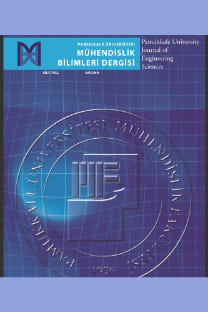Betonarme perdeli sistemlerin itme analizi için özelleşmiş yeni bir sonlu eleman
Sonlu eleman, Doğrusal olmayan davranış, Betonarme perde, İtme analizi
A new dedicated finite element for push-over analysis of reinforced concrete shear wall systems
___
- Fahjan YM, Başak K, Kubin J, Tan MT. “Perdeli betonarme yapılar için doğrusal olmayan analiz metotları”. 7. Ulusal Deprem Mühendisliği Konferansı, İstanbul, Türkiye, 30 Mayıs-3 Haziran 2011.
- Miao ZW, Lu XZ, Jiang JJ, Ye LP. “Nonlinear FE model for RC shear walls based on multi-layer shell element and microplane constitutive model”. Computational Methods in Engineering and Science, Sanya, Hainan, China, 21-23 August 2006.
- Cengiz EY. Yeni Bir Perde Eleman Modeli ve Çok Katlı Perde-Çerçeveli Yapı Sistemlerinin Göçme Güvenliğinin Belirlenebilmesi için Yük Artımı Yöntemi. Doktora Tezi, İstanbul Teknik Üniversitesi, İstanbul, Türkiye, 2004.
- Kwan AKH, He XG. “Finite element analysis of effect of concrete confinement on behavior of shear walls”. Computers and Structures, 79(1), 1799-1810, 2001.
- Xucheng W, Xiaoning W. “Simplified method for elasto-plastic finite element analysis of hardening materials”. Computers and Structures, 55(4), 703-708, 1995.
- Kwak HG, Kim DY. “Nonlinear analysis of RC shear walls considering tension-stiffening effect”. Computers and Structures, 79(5), 499-517, 2001.
- Kwak HG, Filippou FC. “Nonlinear FE analysis of R/C structures under monotonic loads”. Computers and Structures, 65(1), 1-16, 1997.
- Akkaya Y. Düzlem Gerilme Durumunda Betonarme Elemanların Doğrusal Olmayan Davranışının Sonlu Eleman Yöntemiyle İncelenmesi, Doktora Tezi, İstanbul Teknik Üniversitesi, İstanbul, Türkiye, 2006.
- Lefas ID, Kotsovos MD, Ambraseys NN. “Behavior of reinforced concrete structural walls: Strength, deformation characteristics and failure mechanism”. American Concrete Institute-ACI Structural Journal, 87(1), 23-31, 1990.
- Saygun AI. Eğri Eksenli, Kutu Kesitli Kirişlerin Hesabı için Bir Sonlu Elemanlar Yöntemi, Doçentlik Tezi, İstanbul Teknik Üniversitesi, İstanbul, Türkiye, 1979.
- SAP 2000 Advanced 14.1.0. Structural Analysis Program, Computers and Structures Inc., Berkeley, California, 2009.
- ISSN: 1300-7009
- Başlangıç: 1995
- Yayıncı: PAMUKKALE ÜNİVERSİTESİ
Baraj göllerinin iklimsel etkisi ve Vali Recep Yazıcıoğlu Gökpınar baraj gölü örneği
Ülker Güner BACANLI, Ayşe Tuğba TUĞRUL
Gülcan BOZKAYA, David A. BANKS
Nanoatıklar ve çevre: Atık yönetiminde yeni bir yaklaşım
Hidrokarbon aramacılığında düşük yoğunluklu tabakayı bulmak için yeni bir yöntem
Keban metamorfitlerinin stratigrafisine ilişkin yeni yaş bulguları
Sandıklı (Afyonkarahisar) havzasında yeraltısuyu seviye değişimini etkileyen faktörler
Fatma AKSEVER, Ayşen DAVRAZ, Remzi KARAGÜZEL
Betonarme konsol istinat duvarlarının parçacık sürü optimizasyonu ile optimum tasarımı
Ali Haydar KAYHAN, Ahmet DEMİR
Betonarme perdeli sistemlerin itme analizi için özelleşmiş yeni bir sonlu eleman
Delal Doğru ORMANCI, Ahmet İşın SAYGUN
Burkulması engellenmiş çelik çaprazlar
Irgıllı beldesi (Denizli) yerleşim alanının jeolojik ve jeoteknik özellikleri
